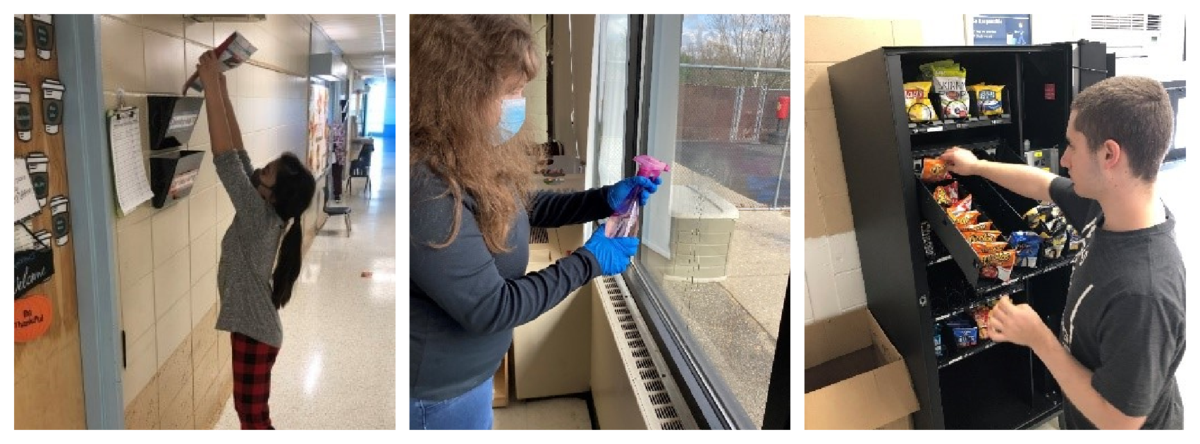School Age 5-21 Years
What is the School-Age Program?
The Children’s Day Program (CDP), serves students ages 5 to 21 who have an identified developmental delay or disability. With campuses located in Huntington and Smithtown, the school-age program serves students with an educational classification of autism, intellectual disabilities, or multiple disabilities.
What Services are Available through the Children's Day Program?
Designated as a School of Excellence by the National Association of Special Education Teachers (NASET), CDP provides a transdisciplinary model of high-quality and innovative educational services to more than 220 students. A highly individualized curriculum is designed and implemented by a team of educators and related service providers. Related services may include speech, occupational therapy, physical therapy, and vocational training. Special areas of instruction include adapted physical education, art, music, and technology.
Enhanced clinical supports and behavioral expertise are hallmark features of CDP. Many of the clinical staff are licensed behavior analysts (LBA), board certified behavior analysts (BCBA) or have completed advanced studies in behavior analysis. The clinical team includes licensed psychologists, social workers, clinical coordinators, behavior specialists and behavior support staff who work seamlessly with the education team to provide high-quality instruction and wrap-around supports.
Families and caregivers work in partnership with the educational team through participation in quarterly team meetings, Individualized Education Program (IEP) planning, and parent training. CDP offers respite to eligible students on a rotational basis.
What are the Educational Approaches and Services through the Children's Day Program?
Instructional Approach
Treatment and teaching practices at CDP stem from the replication of evidence based research, focusing on the principles of Applied Behavior Analysis (ABA). A variety of educational approaches are utilized in the provision of effective instruction, meeting individualized IEP’s and accomplishing DDI’s mission to achieve a lifetime of growth through exceptional care and innovative individualized services.
Data-driven treatment practices aligned with ABA and Positive Behavior Support strategies include the utilization of the Autism Curriculum Encyclopedia (ACE), an ABA software for assessment, individualized curriculum, data collection and progress assessment. Errorless teaching and systematic prompt fading approaches are embedded within various teaching strategies of discrete trial training, shaping, task analysis, incidental teaching, maintenance and generalization. Individualized instruction and group lessons address academic, discrimination, social, communication, health and safety, self-care, independent daily living, recreation, physical education, community, transition to adulthood and vocational skills.
Social-Emotional Learning (SEL)
Classroom teachers are provided supplemental materials to teach/review the (SEL) Competencies; Self-Awareness, Self-Management, Social Awareness, Relationship Skills, and Responsible Decision-Making. The SEL Competencies are covered over the course of the school year from a selection of established lessons/activities.
Are Summer Services Offered at the Children's Day Program?
CDP offers a traditional school year as well as a summer program. Students enrolled in CDP are eligible for a 12-month educational placement. CDP also offers summer placements to students that attend school elsewhere who are eligible through their Committee on Special Education (CSE).
What is the CDP Transition-Education-Employment Model (T.E.E.M.)?
Empowering students with the skills needed for a lifetime of personal growth and achievement is our mission. The T.E.E.M approach supports students in strengthening their self-esteem, communication skills, social skills, and job skills by building upon three key areas:
Transition
- Guide and support families through the transition to OPWDD adult services and guardianship.
Education
- Implement school-wide and individualized positive behavior supports.
- Ongoing transdisciplinary educational planning and implementation.
Employment
- Provide early and continued exposure to employment-related experiences and responsibilities.
- Provide in-house and community-based job sampling opportunities to all students age 12-21.
- Nurture and expand community partnerships with local businesses to offer robust and meaningful employment choices to students.
What Vocational Services are Offered at the Children's Day Program?
Our Vocational Education Program focuses on preparing students to become productive members of the workforce by teaching skills such as problem-solving, daily living, personal safety and organizational skills.
Pre-Vocational Training
Each student in the Children’s Day Program is assigned an in-school job. Depending on the student’s age, they will be assigned a job within their own classroom or one around the building. In-school jobs are created to help ensure that each assignment is an integral part of the building's daily functioning.

The Practical Assessment Exploration System (PAES) Lab
The PAES Lab is a simulated work environment used to assess a student's competitive work potential and interest level, while simultaneously exploring various jobs, using real tools and developing proper work behaviors in the following five areas: Computer Technology, Construction/Industrial, Processing/Production, Consumer/Service and Business/Marketing. When entering the lab, students become employees and teachers become supervisors. Link http://www.talentassessment.com/paes.html
Community-Based Volunteer Opportunities
Areas of strength and interest are assessed with our Educational Team as well as the individual and their family to identify skills that can be developed through volunteer positions in the community. Students are accompanied by a vocational specialist in groups of no more than 4 individuals into the community and engage in job tasks in real-world job placements.

How Do I Enroll My Child in the Children’s Day Program?
Families are encouraged to work with their child’s CSE to determine if CDP would be an appropriate educational placement. Once a referral for a potentially eligible student is received by CDP, the student and family will be invited to participate in a screening/tour conducted by the transdisciplinary team.
For additional questions about enrollment, please contact a member of our social work team:
Huntington Campus (Students Ages 5-21)
Alysa Schiff, Social Worker
(631) 266-4420
Smithtown Campus (Students Ages 14-21)
Brianna Wolf, Social Worker
(631) 366-2989